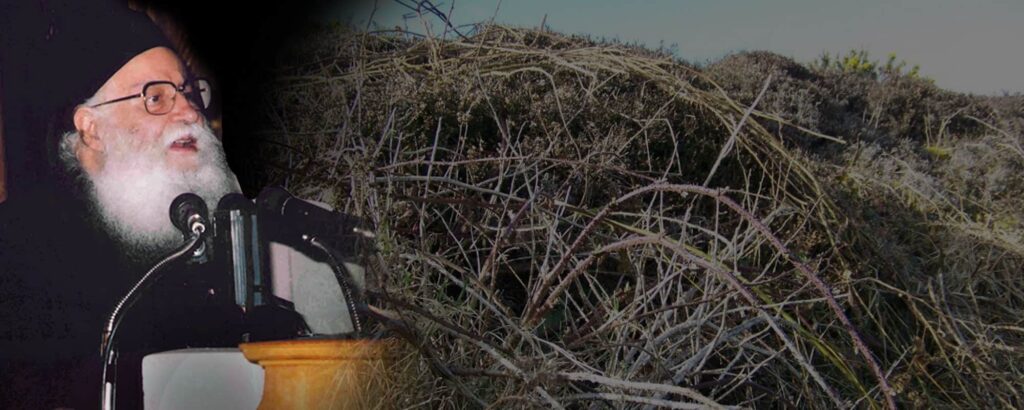
The Parable of the Wicked Farmers
Homily on the Parable of the Wicked Farmers - Fr. Athanasios Mitilinaios
13th Sunday of Matthew | HOMILY 70
A householder planted a vineyard, put up a fence around it,
dug a wine press, built a tower, let it out to farmers and went abroad. (Mt. 21:33; cf. Lk 20:9, Mk. 12:1)
We see here, my beloved, time which God uses for the salvation of a people, but also for the salvation of a soul. God is the householder who plants the vineyard. That is to say, He plants His people on the earth, but He also plants every human soul, every human who exists and lives; and since He will take care in every way to provide all that is necessary for a good cultivation, He asks for fruit. But let us take a closer look at the parable to unfold its meaning.
A certain man planted a vineyard and let it out to the farmers having previously dug a winepress inside, provided all that is necessary in order to make wine from the grapes, but also for the cultivation of the vines, and went so far as to put a fence around it. He gave this vineyard to the farmers all prepared and left. The time came to harvest the fruit, so he sends some of his servants to get fruit from the farmers. But instead of giving the fruit, they beat some of the servants, stoned others and killed others. He sends servants for a second time and, again, they treated these in a similar manner, so he says, I will send my son; they will be ashamed [ντραπούν], he is my child. When they saw the son approaching, those wicked farmers said, This is the heir; let’s kill him, and they seized him, cast him outside of the vineyard and there they killed him. And the Lord says, Tell me, when this householder returns, what will he do to those farmers? His listeners answered, He will destroy those wicked farmers in a most miserable manner.
This parable, my beloved, is a truly frightening parable, but it has power both for peoples and for human existence. God warns about a spiritual fruit-bearing. Do not forget how He warned Noah and through Noah, Noah’s generation, that He would bring a flood if they did not repent. (Gen 6:13-14) The ark was under construction for one-hundred years, not only because it was difficult to construct such an enormous project in those days, but, mainly, to give time for the people to repent.
Remember also how He warned the Ninevites, through the Prophet Jonah, that Nineveh would be destroyed. After many years Nineveh was overthrown, because they repented only temporarily and not with depth and with fruit of repentance. This is the way God gives a warning, that unless the people repent, He will bring destruction.
The vine is the people of God, a people above all other peoples which God Himself planted. First, it was the people of Israel; today it is His Church. He says this in the Prophetical writings, through the Prophets Isaiah and Jeremiah: I planted you a fruit-bearing vine, true in every way. (Jer. 2:21) I myself, He says to Israel, planted you a true vine, genuine and fruit-bearing, with everything necessary to bear fruit. And He continues through the Prophet Isaiah, And he put up a fence around it and removed the stones, made a wine press, planted a choice vine, built a tower in the midst of it and also hewed a wine-press in it. (Is. 5:2)
All of this indicates genuine care for the people of God. Observe, the people of God cannot be anything but choice and are obliged to be choice. Later, when it will be proven that this vine is unable to produce fruit, God will take exception, and says through the prophet Isaiah: I expected for it to produce grapes, I waited for it to produce grapes, but it produced thorns. (Is 5:4) I expected for it to produce judgment, but it brought forth iniquity and not righteousness, but a cry. (Is 5:7) I waited for it to bear fruit, fruit of virtue, but it brought forth instead the fruit of iniquity and of outcry and of contention and of unbelief and of apostasy.
My beloved, it makes an impression, how the people of God end up becoming a fruitless vine. Christ is coming, and because His Father planted this vine, He says, I took you out of Egypt and planted you as a choice vine here in the promised land and your branches spread out; and now I ask for fruit. (Jer 2:21)
The Psalmist says, O Lord, do not destroy this vine, that which Your right hand planted. (Ps. 79:15) Lord, he says, wild boars have entered your vineyard and destroyed it (that is, the surrounding peoples). Please, says the devout Psalmist, do not destroy this vine, but rather, bless that which was planted by Your right hand. (Ps. 79(80) 13-14) (This is also what the bishop says when he blesses the people. It is this very verse from the psalm.) However, this vine, as God says here, proved to be ingenuine.
God sent prophets again and again. He also sent His Son: They will be ashamed before My son. (Mt 21:37) This is very telling as it indicates that there is only one stronghold left that can protect the soul. Shame. When shame has left, nothing remains in the human soul. Pay attention, please. We men do everything we can to tear down shame!
Yesterday a a 20 year-old young man, when told by someone older than him to be careful in some things, said, “Why? Everything is permitted for me, I can do everything.” I said to him, “Yes, you know what the Apostle Paul says: Everything is lawful for me, but not all things are expedient. (1 Cor. 10:23) Yes, all things are permitted to you, but not everything is beneficial for you and you permit everything because you are free. You are like the farmers; it is within your power to assault those whom God sends seeking fruit from you. Moreover, you can even kill God within your soul and say, “God does not exist.” Certainly, He permits you to. Is this beneficial for you? This is not beneficial for you.
And how does one arrive at this end? When shame has been discarded. Because when you say “I can do everything” it means that shame has left. Do you know how great a thing shame is, my beloved? It is a guardrail. Today you see these things I have mentioned to you in every behavior. We are trying to tear down the virtue of shame, with the result that we accept all the evils.
For example, when our child has natural shame, whether our boy or girl, we consider it an inhibiting element for what we call a “normal” social life and we try to remove the shame from our children, supposedly for them not have a complex, so that they can go on with their life and succeed and dominate. This is a goal. So it is, those who are wicked and those who do evil have removed shame before God, because what did the Father say? He said, I will send the Son, the Logos of God, they will be ashamed. They were not ashamed and they murdered Him outside the vineyard. Why does He say “outside” the vineyard and not inside the vineyard, since it is known that Christ was crucified in Jerusalem? This shows that they wanted to make the vineyard their own; and by murdering the Son outside the vineyard, they wanted to completely alienate him from the inheritance.
Thus, a people ends up being an ungodly people. It ends up killing its God. Christ, however, seeing that this people did not bear fruit as was proper, on the night He was about to be handed over, says to His disciples, “I am the true vine and My Father is the vine dresser.” (John 15:1) What does this mean? The vine, the one which God planted, Israel, is condemned for it did not prove to be a true vine, as God says, I planted a true vineyard, but the work of God is not in vain; as a result, I myself have come to be the true vine.
At first, the true vine was a people, now it is a person. So then, we have a new vine, says the Lord: I am the true vine. Whoever will stay as a vine branch united to Me, this one will bear much fruit. Stay united with Me in order to bear fruit. Stay united with me in order to produce fruit, for every branch that is not united with Me, My Father cuts off and throws out; and it dries up, withers and is put into the furnace in order to burn in the flames of hell. (John 15:1-6)
Βut He poses another question, my beloved. Is this new vine which was planted on the earth, which is Jesus Christ, condemned like the old vine? Away with the thought! Away with the thought! Because it is Jesus Christ Himself; He remains a true vine. But now, however, we have something else. The branches, we the believers, are cut off! This, truly, is the great crime which we commit against ourselves. The result? Whatever God said for Israel of old, now applies for us Christians when we are cut off from the true vine, Jesus Christ. What does He say? Hear what He says, And I will break down its fence and it will be for plunder. I will break down its wall and it will be trampled on; and I will despise my vineyard and it shall never be pruned or tilled; and I will leave it barren land for thorns. I will remove the wall and it will be trampled on and it will be plundered by enemies. (Is. 5:5-6)
This is what a people who are cut off from the true vine, Jesus Christ, end up as, beloved ones. A barren place. But also one soul, one person, one heart that is cut off from Jesus Christ can turn into a barren vine. How does this happen? From being trampled on. Why does He say “trampled”? Just as in the parable of the Sower (Mt. 13:3), it means that all human ideas pass through the human heart or a people and flatten it and make the human heart or a people barren. And then, oh then! What comes next? Thorns grow. Wicked crops. What comes next? Doing evil deeds. When a heart ends up hard, like land that has been trampled on, how is it possible for it to ever produce good fruit?
There is more, something still further. Christ said, I do not condemn anyone (John 8:15), He the Logos who said He will judge on the last day. (Mt. 25:31) The Logos of God will indeed judge those whom He said (25:33). However the Lord also told us this in another instance, in the parable of The Wicked Servant. (Luke 19:12-27) He says, Servant, I will condemn and judge you from your own mouth. I will condemn you based on what your yourself say. (Mt. 25:24) It is the same here. He asks His listeners, Tell me, when the Lord of the vineyard will come and it is the Monday of Christ’s Second Coming, but also the death of every person, what will he do to those wicked farmers? And they said, Those evil ones will be put to death in a miserable way. (Mt. 21:41)
Another of our Evangelists relates to us that when Christ said He will give the vineyard to another nation, His listeners said, “God forbid!” (Luke 20:16) Here we have an awakening! In other words, When You say it will be given away, we will cease to be the vine of God? Will there be another nation? Another vineyard of God? God forbid! Unfortunately, their “God forbid” was unfruitful, either because it was said only by a few lips or because it was quickly forgotten.
Well, the catastophe is coming. As it happens with a people, so it happens with each individual man. You will tell me this parable is melancholic. If we do not produce fruit of repentance, my beloved, fruit of love, fruit of faith, fruit of virtue, then the cutting off will come quickly. How will we produce fruit for the Lord? By remaining united with the true vine. This union means communion of juices, because the juice which circulates to the root of the vine cannot but circulate to the branches when they are united with the trunk of the vine. Let us therefore remain united, my beloved, with the true vine who is Jesus Christ, because the Logos of God warns us that those who distance themselves from God will be destroyed.
Translated by A.K.H, Sept 3, 2023 | source audio: arnion.gr

